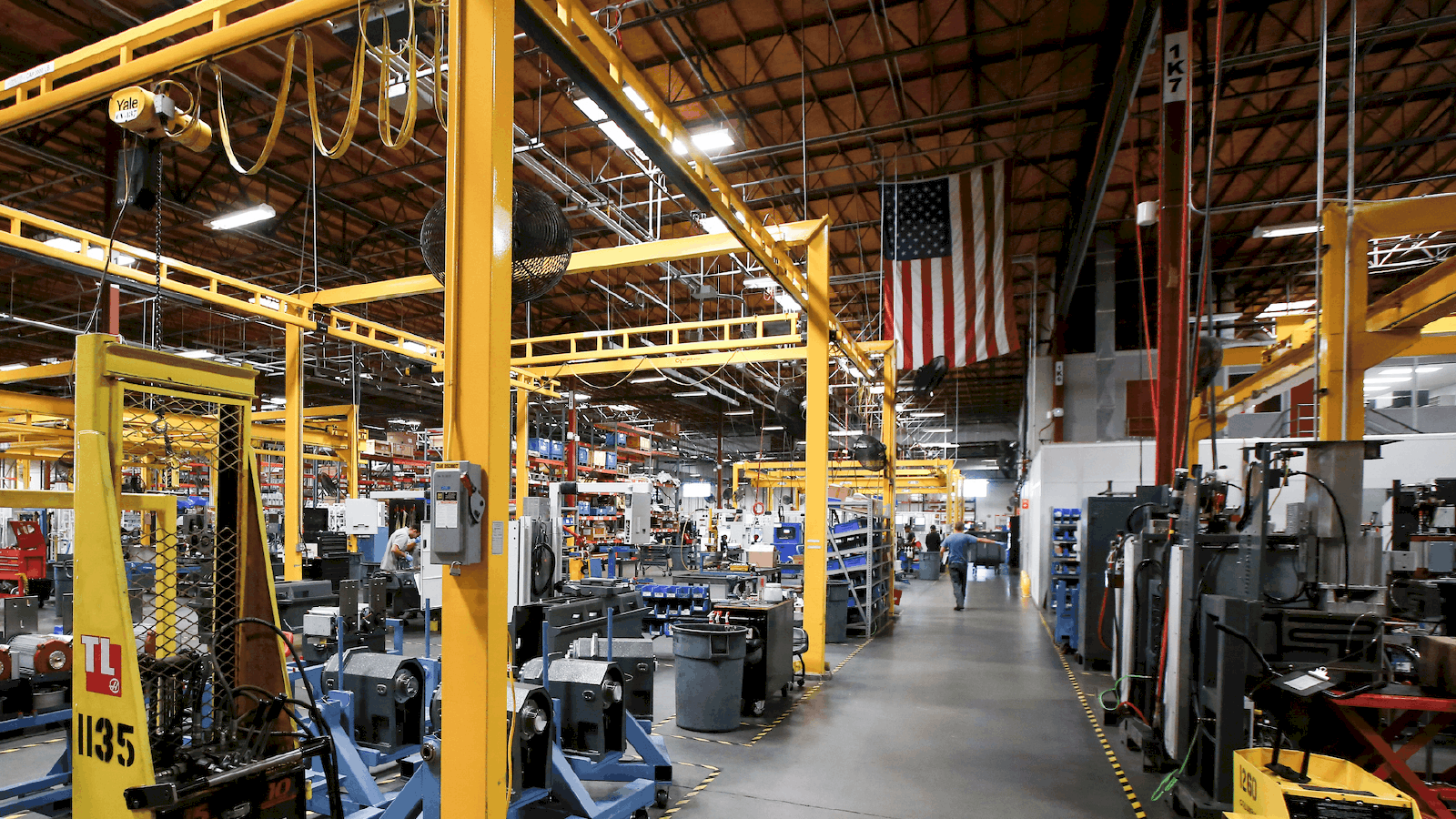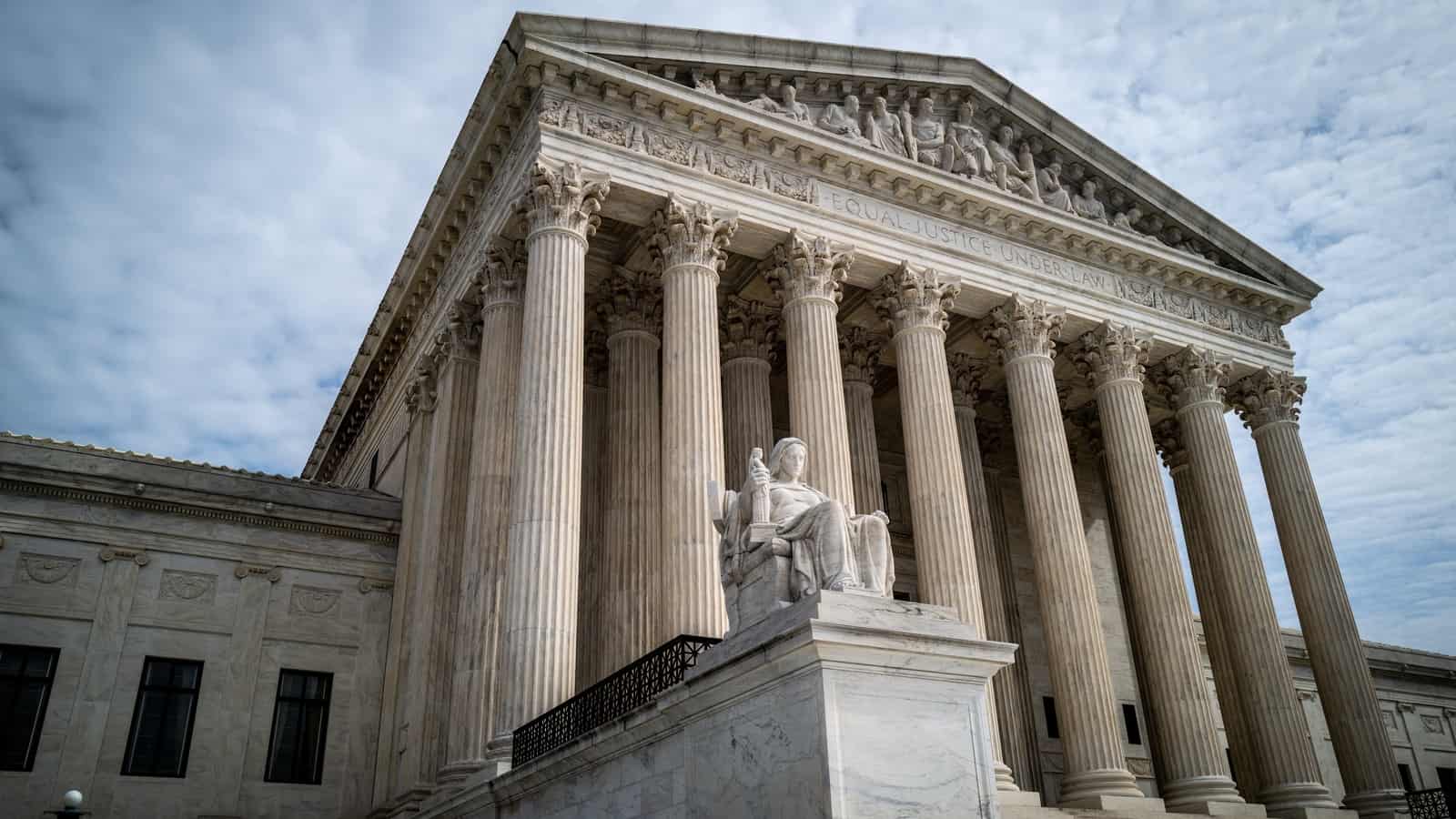Manufacturers Share Commitment to Vaccination
Requirements Must Be Structured in a Way That Does Not Negatively Impact the Operations of Manufacturers
Washington, D.C. – Following President Biden’s speech on new measures to combat COVID-19, National Association of Manufacturers President and CEO Jay Timmons released this statement:
“Americans can be grateful to President Trump for ‘Operation Warp Speed’ that enabled the United States to develop the lifesaving vaccines against COVID-19 and to President Biden for his continued focus on getting Americans vaccinated. We share their steadfast focus, and manufacturers have led the way in promoting the lifesaving COVID-19 vaccines. They are safe and effective vaccines made for us, by people like us—manufacturers in America.
“We look forward to working with the administration to ensure any vaccine requirements are structured in a way that does not negatively impact the operations of manufacturers that have been leading through the pandemic to keep Americans safe. It is important that undue compliance costs do not burden manufacturers, large and small alike.
“Getting all eligible Americans vaccinated will, first and foremost, reduce hospitalizations and save lives. But it is also an economic imperative in that our recovery and quality of life depend on our ability to end this pandemic. This is why the NAM and The Manufacturing Institute continue equipping manufacturers of all sizes with resources to promote vaccination through our ‘This Is Our Shot’ project.”
-NAM-
The National Association of Manufacturers is the largest manufacturing association in the United States, representing small and large manufacturers in every industrial sector and in all 50 states. Manufacturing employs more than 12.3 million men and women, contributes $2.35 trillion to the U.S. economy annually and has the largest economic multiplier of any major sector and accounts for 58% of private-sector research and development. The NAM is the powerful voice of the manufacturing community and the leading advocate for a policy agenda that helps manufacturers compete in the global economy and create jobs across the United States. For more information about the NAM or to follow us on Twitter and Facebook, please visit www.nam.org
NAM Launches Manufacturers United

With major policy issues coming to a head this fall in Washington, the National Association of Manufacturers this week launched Manufacturers United – a new digital platform to power the industry’s grassroots advocacy.
We spoke with some of the people behind the effort to learn more about what it does, how it works, and why manufacturers across the country should use it to highlight their priorities and make their voices heard.
What it does: Manufacturers United provides a clear platform and a wide range of easy-to-use tools for individual manufacturers to take action to advance the industry’s policy priorities:
- “Manufacturers United is the central resource where manufacturers, those who work in our industry and everyday Americans who care about the future of manufacturing in the United States can come together and take meaningful action, said Assistant Vice President for Advocacy at the NAM Michael O’Brien. “Congress is currently working on urgent priorities ranging from infrastructure investments to revisiting tax reform. Manufacturers United gives you the tools and resources — from posting key messages to social media, sending a message to your representative, all the way to helping you attend a congressional town hall, or host a member at your facility — that help you take action.”
A helping hand: In addition to giving manufacturers the tools to advocate for their causes, Manufacturers United also offers access to members of NAM staff who can help you navigate and make effective use of these advocacy tools and opportunities.
Why it matters: Research shows that persistent, sustained advocacy is incredibly important – and that outreach from individual constituents has the most impact, especially when policymakers are undecided on an issue. MU unleashes the power of manufacturers who have been interested in advocacy, but haven’t known where to start.
“The NAM will always be there to serve up full and comprehensive information on policy matters and other leading issues, but we’re seeing a real hunger from our members to actually join the fight,” said NAM Grassroots Strategist Alex Przybelski. “Manufacturers United helps them scale campaigns themselves and move their issues forward.”
How it works: Manufacturers United is designed to help individuals take a number of actions in support of manufacturing priorities. A few ways to plug in are:
- Get up to speed and take action on current issues like fighting new taxes on manufacturers, advancing historic infrastructure investment, and other major issues
- Sign up by texting MU to 52886 for updates about the major issues MU is working on (or just visit the homepage and sign up)
- Get to know the NAM staff who can help you put these tools to work
The bottom line: “Manufacturers United is about harnessing the power of manufacturing voices,” said O’Brien. “What’s at stake, fast facts and useful statistics, how to take action – it’s all there to help individual manufacturers find information and act on it to create an impact.”
Learn more: Find out more at www.manufacturersunited.org.
Manufacturers Secure Duty Drawback Victory in Federal Court
Washington, D.C. – Following the U.S. Court of Appeals for the Federal Circuit decision in National Association of Manufacturers v. Department of the Treasury, NAM Senior Vice President and General Counsel Linda Kelly released this statement:
“The NAM is very gratified to see the court agreed in full with the trial court’s decision holding that Congress spoke clearly when it created and expanded the duty drawback program to support U.S. exports. Put simply, this program helps manufacturers in America level the playing field when they sell to overseas markets. We look forward to working with our members as they expand their operations and add jobs in the United States in light of today’s decision.”
-NAM-
The National Association of Manufacturers is the largest manufacturing association in the United States, representing small and large manufacturers in every industrial sector and in all 50 states. Manufacturing employs more than 12.4 million men and women, contributes $2.44 trillion to the U.S. economy annually, has the largest economic multiplier of any major sector and accounts for 58% of private-sector research and development. The NAM is the powerful voice of the manufacturing community and the leading advocate for a policy agenda that helps manufacturers compete in the global economy and create jobs across the United States. For more information about the NAM or to follow us on Twitter and Facebook, please visit www.nam.org.
Why Trade Promotion Authority Matters

While Americans have largely focused in recent months on the recovery and renewal of our domestic economy, manufacturers also recognize the critical importance of global markets for their success. That makes trade agreements incredibly important—and underscores the urgency of renewing Trade Promotion Authority, a current focus of the NAM.
We recently spoke to NAM Vice President of International Economic Affairs Ken Monahan about this essential issue.
What it is: Trade Promotion Authority is a legislative framework between Congress and the executive branch that details the priorities and consultative process for U.S. trade negotiations. Essentially, said Monahan, Congress lays out its trade negotiation objectives and oversight obligations in TPA legislation, and in exchange, the president is able to negotiate trade agreements that will ultimately receive an up or down vote in Congress.
Why it matters: TPA can help ensure that new trade deals will reflect the priorities of manufacturers in the United States, said Monahan. With 95% of consumers living outside U.S. borders, and with more than 6 million U.S. manufacturing jobs depending on exports, trade agreements are needed to give manufacturers access to other markets on the right terms.
- “From a business perspective, having a TPA that reflects the priorities of manufacturers on the front end is vitally important,” said Monahan. “We are urging the Biden administration to prioritize a robust trade agenda that will open markets with countries with which we don’t already have agreements.”
- “We’re rightly focused on the domestic market, including through our support for the infrastructure package moving through Congress, but manufacturers also need to be able to compete overseas and access markets around the world.”
Where we are: To date, the Biden administration hasn’t detailed a strategy for the negotiation of new trade agreements. TPA was last passed by Congress in 2015, but that authority expired at the end of June.
What manufacturers want: Last year, the NAM laid out manufacturers’ priorities for trade agreements in comments submitted to the U.S. International Trade Commission. “In broad strokes, manufacturers want four things with respect to trade agreements,” said Monahan.
- “First, reverse unfair trade barriers that impede our ability to export.”
- “Second, protect intellectual property through technology leadership and innovation.”
- “Third, raise global standards to ensure a level playing field and ensure that other countries have standards that are consistent with ours.”
- “And fourth, codify respect for the rule of law and the pivotal role of free markets around the world.”
What the NAM is doing: The NAM has been leading the charge on TPA, ramping up engagements in recent weeks with members of Congress and the Biden administration. Most recently, NAM President and CEO Jay Timmons called on President Biden to work with Congress without delay to renew TPA.
The last word: “The United States needs to be back in the game,” said Monahan. “Our trading partners are negotiating agreements among themselves that are excluding the United States. Manufacturers need to access new markets. We need more exports that support good-paying jobs. And in order to accomplish that, we need to get off the sidelines and negotiate new trade agreements that will support growth here at home by reducing barriers faced by manufacturers around the world.”
What’s in Biden’s Executive Order on Competition?

The Biden administration released an executive order last week that is intended to enhance competition. While agencies will still have to draft regulations in response to the EO, this plan could have a big and potentially negative impact on manufacturers in several sectors. Here’s what manufacturers need to know, according to the NAM’s policy experts.
Antitrust provisions: The EO directs the Federal Trade Commission and Department of Justice to reexamine previously completed mergers and review the guidelines for both horizontal and vertical mergers.
- Why it matters: Business combinations help manufacturers streamline operations and boost efficiency. This directive could hinder pro-competitive mergers and ultimately harm consumers, says NAM Vice President of Tax and Domestic Economic Policy Chris Netram. The NAM has previously weighed in with the FTC on its vertical merger guidelines and its premerger notification rules, highlighting the importance of predictability in the merger approval process.
Other key points of interest: the EO also tells the agencies to crack down on noncompete agreements that keep workers from changing jobs easily, as well as on employers’ collaborations to reduce wages and benefits.
“Right to repair”: Another key target of the EO was the so-called “right to repair”—the ability of third parties to repair sophisticated equipment, like tractors, without involving the manufacturer.
- Why it matters: The NAM has long argued that such repairs pose a danger to consumers and expose companies’ intellectual property to theft by competitors, Netram points out.
Health Care: The EO also covers certain practices in the health care and pharmaceutical industries. Manufacturers should be aware of the following moves:
- Within 45 days, the Department of Health and Human Services is instructed to come up with a plan to address high drug prices. HHS is also directed to work on the importation of drugs from Canada.
- Meanwhile, the FTC is tasked with banning “pay for delay” agreements—when industry players agree to delay the market entry of generics or biosimilars.
- Why it matters: These moves could endanger America’s global leadership in the development of lifesaving treatments, argues NAM Vice President of Infrastructure, Innovation and Human Resources Policy Robyn Boerstling, by reducing the returns on and protections for innovation. This could potentially lead to fewer treatments being developed overall.
Technology: The EO addresses technology policy in a number of ways, most prominently urging the reinstatement of “net neutrality” rules imposed by the Obama administration.
- Why it matters: The NAM urged the repeal of those rules back in 2017. As Boerstling puts it, “net neutrality” treats the new and dynamic technology of broadband as if it were indistinguishable from the telephone, and treats competition in communications technology as if it hadn’t changed since the mid-20th century.
Other key points: The EO also instructs the Federal Communications Commission to hold spectrum auctions that disallow excessive concentration, and to create new reporting requirements for broadband providers’ prices and subscription rates.
Transportation: Lastly, the EO addresses certain practices by railroads, airlines and other sectors in transportation. For example:
- It urges the Surface Transportation Board to require railroad track owners to let competitors and passenger trains have right of way.
- It asks the Federal Maritime Commission to target certain shipping practices—mainly relating to fees charged while goods wait in containers to be unloaded, or while the company has yet to return an emptied container.
The NAM says: NAM President and CEO Jay Timmons released a statement last week, saying, “Our sector is strong and growing, and our people are benefiting. Unfortunately, there are those who want to erode our competitive advantage with archaic tax policies. And some of the actions announced today are solutions in search of a problem; they threaten to undo our progress by undermining free markets and are premised on the false notion that our workers are not positioned for success.”
Read the NAM policy team’s full overview of the EO here.
Manufacturers on Biden EO: Some Actions Are Solutions in Search of a Problem That Doesn’t Exist
Timmons: Manufacturers are keeping our promises to invest, hire and grow wages; Let’s not stall the progress
Washington, D.C. – National Association of Manufacturers President and CEO Jay Timmons released the following statement after President Joe Biden signed an executive order today on promoting competition in the American economy.
“Manufacturers are helping lead the recovery, building the next, post-pandemic world. And as the industry rebounds, manufacturing workers are seeing their lives improve. According to the Q2 Manufacturers’ Outlook Survey, manufacturers expect record levels of full-time employment growth. And following the enactment of tax reform, manufacturers kept their promises to raise wages and benefits: wages rose 3% in 2018, 2.8% in 2019 and 3% in 2020—the fastest rates of annual growth since 2003. What’s more, manufacturers have 814,000 jobs to fill right now—opportunities for more Americans to have well-paying, meaningful careers.
“Our sector is strong and growing, and our people are benefiting. Unfortunately, there are those who want to erode our competitive advantage with archaic tax policies. And some of the actions announced today are solutions in search of a problem; they threaten to undo our progress by undermining free markets and are premised on the false notion that our workers are not positioned for success. We have challenges, to be sure, which is why we are advocating infrastructure investment, competitive tax rates, immigration reform, ensuring availability of lifesaving cures, expanded export opportunities and more. And it’s why we launched our Creators Wanted campaign—to inspire more Americans to pursue modern manufacturing careers in the industry that literally builds our nation’s future.
“As always, manufacturers are focused on policies that genuinely uphold the values that make our country exceptional and our industry strong: free enterprise, competitiveness, individual liberty and equal opportunity.”
-NAM-
The National Association of Manufacturers is the largest manufacturing association in the United States, representing small and large manufacturers in every industrial sector and in all 50 states. Manufacturing employs more than 12.3 million men and women, contributes $2.35 trillion to the U.S. economy annually and has the largest economic multiplier of any major sector and accounts for 63% of private-sector research and development. The NAM is the powerful voice of the manufacturing community and the leading advocate for a policy agenda that helps manufacturers compete in the global economy and create jobs across the United States. For more information about the NAM or to follow us on Twitter and Facebook, please visit www.nam.org
Supreme Court Delivers Decisive Ruling Upholding Manufacturers’ First Amendment Rights
Washington, D.C. – Today, National Association of Manufacturers Senior Vice President and General Counsel Linda Kelly released the following statement on the Supreme Court’s 6–3 decision in Americans for Prosperity Foundation v. Bonta, Attorney General of California in which the NAM filed an amicus brief:
“The Supreme Court has delivered a decisive ruling upholding manufacturers’ First Amendment rights—and the rights of all who support nonprofit organizations. The Manufacturers’ Center for Legal Action was proud to support the effort to challenge a California law that forced nonprofits and charities to disclose donor information and violate donor privacy. While such intrusion and overreach are obviously a concern for manufacturing associations, the law threatened to chill protected First Amendment activity for all types of organizations that are central to our society.
“The seriousness of the constitutional violation was demonstrated by the fact that groups across the ideological spectrum—and of no ideology—voiced their opposition to the overreaching California law. America is at its best when its citizens can participate fully in associations and support charitable endeavors to advance causes in which they believe without sacrificing their privacy or personal information.
“Freedom of speech and association are fundamental to the strength of our country and to the functioning of our government. Nobody should have to fear they will be targeted for expressing an opinion or for joining with others to speak with a collective voice. The MCLA will always step up to defend manufacturers’ constitutional rights, especially the First Amendment rights that are the foundation of associations, whenever they are threatened.”
-NAM-
The National Association of Manufacturers is the largest manufacturing association in the United States, representing small and large manufacturers in every industrial sector and in all 50 states. Manufacturing employs more than 12.3 million men and women, contributes $2.35 trillion to the U.S. economy annually and has the largest economic multiplier of any major sector and accounts for 63% of private-sector research and development. The NAM is the powerful voice of the manufacturing community and the leading advocate for a policy agenda that helps manufacturers compete in the global economy and create jobs across the United States. For more information about the NAM or to follow us on Twitter and Facebook, please visit www.nam.org
NAM Partners with Global Legal Network

The NAM is joining with Meritas, a global legal alliance, to provide tailored, high-quality and affordable legal assistance to manufacturers across the country.
About the team: Meritas offers a network of 186 full-service, world-class law firms that have been vetted and approved by the organization. The firms are equipped to assist clients with issues from contracts and employment to environmental compliance and intellectual property.
How it works: If any members are facing legal issues, or simply want ongoing legal support for routine challenges, they can contact the NAM’s Manufacturers’ Compliance Institute, which will work with Meritas to identify exactly the right kind of legal professionals who can help. Meritas firms will then provide 30 minutes of free time to connect with the NAM member to figure out if a more formal engagement makes sense. NAM members can even connect with firms in other countries to work through issues that might arise abroad.
- Vetted firms: Meritas’ approved firms have all undergone a stringent vetting process to ensure they meet high standards. Instead of having to search for a reputable lawyer on their own, NAM members can trust that we will connect them with high-quality professionals who can meet their needs.
- Local knowledge: The Meritas network includes more than 7,500 lawyers serving 253 markets in the United States and around the world. This partnership will help manufacturers find assistance and representation from firms that have legal expertise in the relevant region, ensuring they have the best possible information as they move forward.
- Affordable rates: Meritas firms provide high-value services at competitive rates for small businesses and large companies alike. For small and medium-sized manufacturers, Meritas makes legal counsel accessible, helping companies avoid common pitfalls and overcome complex challenges. For larger companies, it delivers strong support at a lower price point than more expensive firms, helping to ensure competitiveness and a strong bottom line.
Why it matters: Finding high-quality, affordable legal counsel with relevant knowledge is extremely challenging. The NAM’s partnership with Meritas makes that process simpler, saving you time and money and strengthening your operations.
The last word: “The NAM’s partnership with Meritas gives manufacturers around the country a clear line into an outstanding network of legal assistance,” said NAM Vice President of Legal and Deputy General Counsel Patrick Hedren. “Whether you’re a small firm trying to avoid common legal challenges, a large company trying get more out of your legal team or an expanding manufacturer trying to navigate a new state or a new country, this partnership provides indispensable value and essential support.”
NAM Responds to Abeyance Order in High-Profile Corporate Governance Case
Washington, D.C. – A U.S. District Court judge has placed Institutional Shareholder Services’ lawsuit against the Securities and Exchange Commission in abeyance pending the outcome of the SEC’s recently announced review of its proxy firm rule. ISS is seeking to overturn a National Association of Manufacturers–supported rule that protects investors by enhancing transparency and accountability for so-called “proxy advisory firms.”
The court’s order comes on the heels of Chairman Gary Gensler’s directive to SEC staff to review the proxy firm rule and the Division of Corporation Finance’s announcement that it will not recommend enforcement action to protect businesses and investors from the firms’ errors and conflicts of interest while said review is ongoing.
“We are disheartened by the SEC’s decision to abandon its defense of these vital reforms just days before a federal judge was to hear oral arguments outlining—as detailed by both the NAM and the SEC over the past several months—why this lawful, reasonable and minimally burdensome rule must be upheld,” said NAM Senior Vice President and General Counsel Linda Kelly. “Although the case is currently stayed, the Manufacturers’ Center for Legal Action will continue to represent manufacturers’ interests—including by calling out any efforts to bypass the required notice-and-comment process to keep this lawfully issued rule on ice indefinitely.”
The NAM will continue to engage directly with the SEC during its ongoing review, as it did throughout the years-long rulemaking process that led to the final rule.
“The NAM championed the SEC’s efforts to bring appropriate oversight and transparency to proxy advisory firms, and manufacturers strongly oppose any efforts to rescind the rule’s critical reforms, which protect the interests of manufacturing workers,” said NAM Senior Vice President of Policy and Government Relations Aric Newhouse. “This rule was developed following years of debate and multiple rounds of public comment, and there is no justification for repealing it less than a year after finalization, without any chance for its vital investor protections to take effect and be fairly evaluated. If the SEC does decide to move forward, any changes must be proposed via notice-and-comment rulemaking with robust opportunities for the public to weigh in on the SEC’s new approach.”
Background:
In October 2020, the NAM filed a motion to intervene in ISS v. SEC, followed by a motion for summary judgement outlining why the SEC’s lawful, reasonable and minimally invasive rule must be upheld. The NAM has long advocated for increased oversight of proxy advisory firms—little-known, unregulated entities that exert enormous influence over publicly traded manufacturers. These firms have significant conflicts of interest and issue error-filled, one-size-fits-all proxy voting recommendations that can impact the direction of a business and the value of investors’ shares. In July 2020, the SEC issued final regulations limiting proxy firms’ outsized influence, a move NAM President and CEO Jay Timmons called a “long-sought, major win for the industry and millions of manufacturing workers.”
-NAM-
The National Association of Manufacturers is the largest manufacturing association in the United States, representing small and large manufacturers in every industrial sector and in all 50 states. Manufacturing employs more than 12.3 million men and women, contributes $2.35 trillion to the U.S. economy annually and has the largest economic multiplier of any major sector and accounts for 63% of private-sector research and development. The NAM is the powerful voice of the manufacturing community and the leading advocate for a policy agenda that helps manufacturers compete in the global economy and create jobs across the United States. For more information about the NAM or to follow us on Twitter and Facebook, please visit nam.org.
The NAM Goes to the Supreme Court

Spring is the season of SCOTUS, when the court releases its most important decisions for the year. This year, the NAM is awaiting decisions on a number of cases in which it participated as an amicus—a “friend of the court”—and has already received one significant victory: a ruling in favor of energy companies on a procedural issue regarding climate lawsuits.
We spoke to two of the NAM’s legal experts—Vice President of Legal and Deputy General Counsel Patrick Hedren and Senior Litigation Counsel Erica Klenicki—to get the overview of this busy season for the NAM’s Manufacturers’ Center for Legal Action.
Energy victory: The court ruled in favor of the energy companies in a suit brought against them by the city of Baltimore. As Hedren puts it, the case hinged on a “wonky procedural issue,” but the crux was this: where should nationwide issues be litigated, particularly if the federal government played some role?
- The energy companies and the NAM argued that climate change is just such a nationwide and even global issue and simply cannot be decided by state courts. The nature of the issue makes access to federal courts paramount.
- SCOTUS’s ruling didn’t address the underlying climate concerns, but it did provide easier access to federal courts for these types of disputes, say Hedren and Klenicki.
Class actions: The NAM is awaiting the Supreme Court’s decisions on several other cases in which it participated, including TransUnion LLC v. Ramirez, which deals with a key issue for large manufacturers and other companies: class-action lawsuits.
- As the NAM’s legal team notes, these cases are often brought by attorneys looking for a payday, even when the vast majority of the “class” in question, though technically affected, was not really injured.
- That’s what happened in this case. The class included people whom TransUnion mistakenly identified as potential matches for individuals on the Treasury Department’s terror watch list, which could have resulted in denials of loans.
- Though the lead plaintiff did allegedly suffer harm due to this error, most of the 8,000-plaintiff class were entirely unaware of the error. The company had fixed its mistake before those plaintiffs were harmed.
To put it simply, the rules for class actions are far from clear, say Hedren and Klenicki. The courts often award damages or settlement money to uninjured people who could not have brought a case on their own. And the only winner in this system is the plaintiffs’ bar. That’s why the NAM is asking SCOTUS to clarify the rules for bringing a class action and ensure that trial courts are applying rigorous standards before certifying a class.
Free speech: The NAM is also awaiting the court’s decision on Americans for Prosperity Foundation v. Becerra, a case concerning whether the government can force an organization to disclose the identities of its donors. While the NAM doesn’t have donors, it does have a keen interest in keeping its member list confidential. If all such lists had to be released, it would “chill free speech,” say Hedren and Klenicki.
Following suit(s): Lastly, the NAM team is asking the court to hear several other cases during its next term, including:
- Miller v. CH Robinson Worldwide, Inc. In this case, the plaintiff was injured by a truck belonging to a small company, yet was allowed to sue the freight broker that hired the trucking company, too—despite a federal law that preempts those kinds of suits. The NAM is asking SCOTUS to consider the case so it can put commonsense limitations on liability.
- City of Oakland, et al. v. Chevron Corp., et al.: This case is very similar to the energy case mentioned above.
The last word: Hedren explains why the NAM’s involvement in our nation’s highest court is so important: “The Supreme Court really values the manufacturing sector’s perspective, in part because bad decisions in a single lower court can have ripple effects across the whole economy. The NAM pays close attention to those cases that might really change—for better or worse—the way the sector operates, or that might open the door for crafty lawyers to abuse the court system. If we’re not out there fighting for better legal policy, we’ll face a legal system increasingly tilted in favor of game-playing and abuse.”
